Leadership, Trust and the Globally Integrated Enterprise reports on IBM’s CEO as he articulated a prescient vision for the enterprise—adapting to the Knowledge Economy.
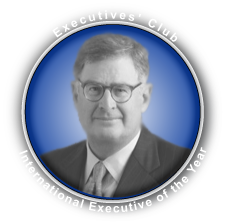 Samuel J. Palmisano, Chairman, President and Chief Executive Officer of IBM Corporation, outlined a new version of the enterprise at a lunch honoring him with the Executives’ Club of Chicago’s Thirteenth Annual International Executive of the Year Award April 12, 2007 at the Chicago Hilton. Entitled “Leadership, Trust and the Globally Integrated Enterprise,” his speech emphasized key points from his Summer 2006 article of the same name in Foreign Affairs. He was especially interesting to hear due to his experience with leading one of the world’s foremost global enterprises as well as his insight from serving global enterprises in every industry. Samuel J. Palmisano, Chairman, President and Chief Executive Officer of IBM Corporation, outlined a new version of the enterprise at a lunch honoring him with the Executives’ Club of Chicago’s Thirteenth Annual International Executive of the Year Award April 12, 2007 at the Chicago Hilton. Entitled “Leadership, Trust and the Globally Integrated Enterprise,” his speech emphasized key points from his Summer 2006 article of the same name in Foreign Affairs. He was especially interesting to hear due to his experience with leading one of the world’s foremost global enterprises as well as his insight from serving global enterprises in every industry.
Yesterday’s model for the global enterprise, the multinational corporation (MNC), looks increasingly outdated due to widespread adoption of standards-based technology, increasingly standardized work processes and a liberalizing regulatory environment. Today, knowledge-based resources are available globally, and the enterprise’s means to create value is choosing how and where to tap the resources to […]
We Must Rethink Learning in the Knowledge Economy
 Academicians everywhere are struggling to improve their students’ competitive standings in the global Knowledge Economy, which levels the playing field in many respects. It is far easier to build a world-class competitor in the Knowledge Economy than it was in the Industrial Economy. A strong educational system is a must, along with a highly motivated population, decent infrastructure and incentives for foreign investment. In former times, being a world competitor necessitated gaining control of vast natural resources to produce a strong industrial base from which world-class armies and navies would be built. India currently exemplifies the Knowledge Economy model very well*, and countries worldwide have taken note. Academicians everywhere are struggling to improve their students’ competitive standings in the global Knowledge Economy, which levels the playing field in many respects. It is far easier to build a world-class competitor in the Knowledge Economy than it was in the Industrial Economy. A strong educational system is a must, along with a highly motivated population, decent infrastructure and incentives for foreign investment. In former times, being a world competitor necessitated gaining control of vast natural resources to produce a strong industrial base from which world-class armies and navies would be built. India currently exemplifies the Knowledge Economy model very well*, and countries worldwide have taken note.
However, the Knowledge Economy is drastically changing what people need to learn to succeed, and educators haven’t caught up yet. They are teaching according to Industrial Economy rules, which compromises the performance of their students.
Educators have a special opportunity to create competitive advantage by realizing that the learning proposition is far different today—due to the Knowledge Economy and the role of information in adding value. The speed […]
China Analysis and Outlook 2007 offers political insight into the global knowledge market.
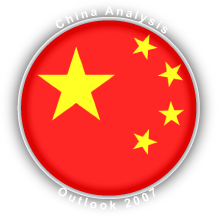 The Strategic Management Association, the Harvard Business School and the CDMA sponsored the 2007 China Outlook, which was given by Lyric Hughes-Hale, Founder China Online in Chicago 9 January 2007. Her presentation was preceded by David Hale’s 2007 Economic Forecast. The Strategic Management Association, the Harvard Business School and the CDMA sponsored the 2007 China Outlook, which was given by Lyric Hughes-Hale, Founder China Online in Chicago 9 January 2007. Her presentation was preceded by David Hale’s 2007 Economic Forecast.
As a long-time China watcher and analyst, Lyric has rare and unusual insights to which I’ll try to do justice before giving my observations. The Global Human Capital Journal also covered the 2006 China Outlook.
[…]
Economic Insight Behind the Global Knowledge Market
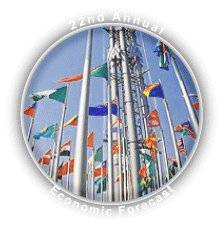 The Strategic Management Association, the Harvard Business School and the CDMA sponsored the 2007 Economic Forecast featuring David Hale, Chairman of Prince Street Capital Management and Lyric Hughes-Hale, Founder China Online. David has international renown as an international economist, and he presented his encyclopedic knowledge and perspective on global economic trends in Chicago on 9 January 2007. Afterward, Lyric shared her insights on China in Part II of the evening. The Global Human Capital Journal also covered the 2006 Economic Forecast. The Strategic Management Association, the Harvard Business School and the CDMA sponsored the 2007 Economic Forecast featuring David Hale, Chairman of Prince Street Capital Management and Lyric Hughes-Hale, Founder China Online. David has international renown as an international economist, and he presented his encyclopedic knowledge and perspective on global economic trends in Chicago on 9 January 2007. Afterward, Lyric shared her insights on China in Part II of the evening. The Global Human Capital Journal also covered the 2006 Economic Forecast.
David’s forecast was global in scope but adapted to his U.S. audience. It reflected many of the numbers behind the global shift to the Knowledge Economy, and how this is driving global prosperity:
[…]
A Must-read Guide to the Importance of Web 2.0 and the Knowledge Economy
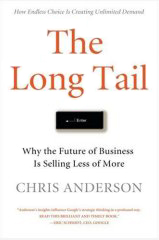 The Long Tail is a watershed book that reflects many of the profound socioeconomic changes wrought by the transition from the Industrial Economy to the Knowledge Economy. The “Long Tail” represents the splintering of the mass market—what is happening, why and how you can thrive in the new era of the niche. Moreover, it shows how the mass market was a temporary phenomenon that developed because niches were not economically viable for producers to address. The Long Tail is a watershed book that reflects many of the profound socioeconomic changes wrought by the transition from the Industrial Economy to the Knowledge Economy. The “Long Tail” represents the splintering of the mass market—what is happening, why and how you can thrive in the new era of the niche. Moreover, it shows how the mass market was a temporary phenomenon that developed because niches were not economically viable for producers to address.
Chris Anderson is editor-in-chief of Wired, and the book has an appreciation for culture, the economics of technology and the importance of innovation. It’s also very well written: Anderson tackles some fairly abstract concepts, but the reader doesn’t trip over them. It’s possible to read the book quickly, but there is plenty of substance for a detailed, reflective reading as well. Difficult to over-recommend!
The Long Tail offers an insightful look into the byte-oriented Knowledge Economy and its movement away from the zero-sum, bits-oriented Industrial Economy—and what this holds for business and culture. The book […]
High Potential for Business Innovation
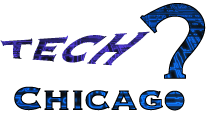 Plus ça change* was the theme of The Executives’ Club of Chicago High Technology Conference December eighth, where an esteemed panel gave varying perspectives on Chicago’s importance as a technology center. William Avery of Brunswick Corporation, James O’Connor, Jr. of Motorola, Inc. and Ira H. Cohen of Goldman, Sachs & Co. spoke about technology from enterprise IT, mobile technology and investment points of view respectively. Prior to their prepared remarks, John Gentry of CSC Consulting outlined key results of the forthcoming Chicago Technology Outlook Survey, in which corporate technology leaders commented on IT trends for 2007 as well as Chicago’s role as a technology center. He moderated the panel during a Q&A session. Plus ça change* was the theme of The Executives’ Club of Chicago High Technology Conference December eighth, where an esteemed panel gave varying perspectives on Chicago’s importance as a technology center. William Avery of Brunswick Corporation, James O’Connor, Jr. of Motorola, Inc. and Ira H. Cohen of Goldman, Sachs & Co. spoke about technology from enterprise IT, mobile technology and investment points of view respectively. Prior to their prepared remarks, John Gentry of CSC Consulting outlined key results of the forthcoming Chicago Technology Outlook Survey, in which corporate technology leaders commented on IT trends for 2007 as well as Chicago’s role as a technology center. He moderated the panel during a Q&A session.
The net-net: Chicago has a way to go before it becomes a preeminent technology center; however, its best chance for creating breakaway value through innovation will lie in not focusing on technology, as explained in Analysis and Conclusions.
[…]
 Consumer empowerment and disruption are being unleashed by the many-to-many Web. As we’ve been writing for some time, Web 2.0 is giving individuals collective voices that can rival the authority of global enterprises and governments, which is disruptive because it changes the rules. We call it Consumer Empowerment. Blogs, social networking, podcasts, wikis, vlogs and their intermediaries like Technorati, MySpace and iTunes give customers the tools to create and distribute content for free—instantly and globally. When rules change, you can quickly strengthen your market position by understanding and adapting more quickly than competitors. Consumer empowerment and disruption are being unleashed by the many-to-many Web. As we’ve been writing for some time, Web 2.0 is giving individuals collective voices that can rival the authority of global enterprises and governments, which is disruptive because it changes the rules. We call it Consumer Empowerment. Blogs, social networking, podcasts, wikis, vlogs and their intermediaries like Technorati, MySpace and iTunes give customers the tools to create and distribute content for free—instantly and globally. When rules change, you can quickly strengthen your market position by understanding and adapting more quickly than competitors.
Google any specific product, phrase or service, and you will notice that customer content is growing quickly, especially in specific, customer-centric areas that organizations aren’t focused on. Customers contribute customer-relevant content because they are passionate about the subject. Growing “tribes” of individuals connect, collaborate, and become smart very quickly. Threat: large organizations are losing control over the information about their reputations, products and services. Opportunity: adding value to these customer-led conversations can increase your credibility and appeal.
Large organizations attained their market power through efficiency, the hallmark of the […]
Excellent guidebook for succeeding in the online world, including social networking
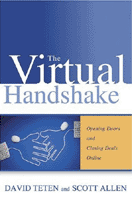 The Virtual Handshake is an immensely valuable book, both as a handbook to the virtual world for the business-oriented person and as a guide to purposeful networking. I was compelled to get it after seeing David Teten speak at a conference because he spoke with authority while explaining new things clearly. Allen and Teten have done a masterful job at writing an interesting book that is full of useful information. Moreover, they succeed at providing a conceptual framework, so the reader can make use of the information. It is also a fun read. The Virtual Handshake is an immensely valuable book, both as a handbook to the virtual world for the business-oriented person and as a guide to purposeful networking. I was compelled to get it after seeing David Teten speak at a conference because he spoke with authority while explaining new things clearly. Allen and Teten have done a masterful job at writing an interesting book that is full of useful information. Moreover, they succeed at providing a conceptual framework, so the reader can make use of the information. It is also a fun read.
As a marketing executive and a management consultant (strategy) since the early 1990s, I have helped to build parts of the virtual world the authors describe. I am very familiar with the topics, and I found the book useful on two key levels:
Conceptual: The virtual world is difficult to understand conceptually because it is boundaryless and serendipitous, and the authors describe what it is enough so you can get to the point: how to interact with it to accomplish what you want. This is extremely important […]
The Knowledge Economy, Ultimate Context for Understanding the Future welcomes you to the Post-Industrial World, which turns past assumptions on their heads.
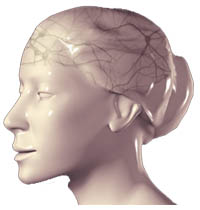 The Knowledge Economy is a post-industrial economy characterized by a highly developed information technology industry along with overproduction and commoditization in industrial and agricultural sectors. Widespread information technology (IT) adoption among producers and consumers enables all market participants to create and share information about all aspects of economic transactions. The creation, packaging and sharing of information is termed “knowledge.” In the Knowledge Economy, information about an underlying good creates most of the good’s differentiated value. The Knowledge Economy is a post-industrial economy characterized by a highly developed information technology industry along with overproduction and commoditization in industrial and agricultural sectors. Widespread information technology (IT) adoption among producers and consumers enables all market participants to create and share information about all aspects of economic transactions. The creation, packaging and sharing of information is termed “knowledge.” In the Knowledge Economy, information about an underlying good creates most of the good’s differentiated value.
Consumer mobilization and engagement in the Knowledge Economy renders many of the Industrial Economy’s rules invalid. In the Industrial Economy, consumers had little information relative to producers, they were isolated from each other, and they had no collective voice. They were at a disadvantage as market participants. The “second stage” of the Internet, “Web 2.0,” facilitates P2P (peer to peer) information sharing, and its tools are free to use and accessible to anyone with an Internet connection. Producers […]
The TransAtlantic Partnership’s Implications for U.S., E.U. Economies summarizes coverage of the EEC International Conference—Talking with the Ambassadors of the World’s Largest Trading Relationship and the CEOs of Four Global Enterprises.
 Three eminent diplomatic leaders and CEOs from Baxter, Financial Dynamics, ITW and Philips briefed Midwest executives on the current status and future directions of the world’s largest trading relationship at the Executives’ Club of Chicago’s International Conference November 15. The half-day program featured several presentations, a CEO panel and a media round table. All speakers sought to impress upon the audience the pivotal importance of the transatlantic alliance for the United States and Europe, and most warned chief executives neither to take it for granted nor to be passive in the face of rising protectionism. Three eminent diplomatic leaders and CEOs from Baxter, Financial Dynamics, ITW and Philips briefed Midwest executives on the current status and future directions of the world’s largest trading relationship at the Executives’ Club of Chicago’s International Conference November 15. The half-day program featured several presentations, a CEO panel and a media round table. All speakers sought to impress upon the audience the pivotal importance of the transatlantic alliance for the United States and Europe, and most warned chief executives neither to take it for granted nor to be passive in the face of rising protectionism.
The fact that the importance of the E.U.—U.S. alliance had to be emphasized brought into sharp relief the relatively sudden rise of Asia as well as the shift from the Industrial Economy to the Knowledge Economy. Both megatrends pose opportunities and threats for the world’s largest economies and enterprises, and […]
|
|
 Samuel J. Palmisano, Chairman, President and Chief Executive Officer of IBM Corporation, outlined a new version of the enterprise at a lunch honoring him with the Executives’ Club of Chicago’s Thirteenth Annual International Executive of the Year Award April 12, 2007 at the Chicago Hilton. Entitled “Leadership, Trust and the Globally Integrated Enterprise,” his speech emphasized key points from his Summer 2006 article of the same name in Foreign Affairs. He was especially interesting to hear due to his experience with leading one of the world’s foremost global enterprises as well as his insight from serving global enterprises in every industry.
Samuel J. Palmisano, Chairman, President and Chief Executive Officer of IBM Corporation, outlined a new version of the enterprise at a lunch honoring him with the Executives’ Club of Chicago’s Thirteenth Annual International Executive of the Year Award April 12, 2007 at the Chicago Hilton. Entitled “Leadership, Trust and the Globally Integrated Enterprise,” his speech emphasized key points from his Summer 2006 article of the same name in Foreign Affairs. He was especially interesting to hear due to his experience with leading one of the world’s foremost global enterprises as well as his insight from serving global enterprises in every industry.
 Academicians everywhere are struggling to improve their students’ competitive standings in the global Knowledge Economy, which levels the playing field in many respects. It is far easier to build a world-class competitor in the Knowledge Economy than it was in the Industrial Economy. A strong educational system is a must, along with a highly motivated population, decent infrastructure and incentives for foreign investment. In former times, being a world competitor necessitated gaining control of vast natural resources to produce a strong industrial base from which world-class armies and navies would be built. India currently exemplifies the Knowledge Economy model very well*, and countries worldwide have taken note.
Academicians everywhere are struggling to improve their students’ competitive standings in the global Knowledge Economy, which levels the playing field in many respects. It is far easier to build a world-class competitor in the Knowledge Economy than it was in the Industrial Economy. A strong educational system is a must, along with a highly motivated population, decent infrastructure and incentives for foreign investment. In former times, being a world competitor necessitated gaining control of vast natural resources to produce a strong industrial base from which world-class armies and navies would be built. India currently exemplifies the Knowledge Economy model very well*, and countries worldwide have taken note. The Strategic Management Association, the Harvard Business School and the CDMA sponsored the 2007 China Outlook, which was given by Lyric Hughes-Hale, Founder China Online in Chicago 9 January 2007. Her presentation was preceded by David Hale’s 2007 Economic Forecast.
The Strategic Management Association, the Harvard Business School and the CDMA sponsored the 2007 China Outlook, which was given by Lyric Hughes-Hale, Founder China Online in Chicago 9 January 2007. Her presentation was preceded by David Hale’s 2007 Economic Forecast. The Strategic Management Association, the Harvard Business School and the CDMA sponsored the 2007 Economic Forecast featuring David Hale, Chairman of Prince Street Capital Management and Lyric Hughes-Hale, Founder China Online. David has international renown as an international economist, and he presented his encyclopedic knowledge and perspective on global economic trends in Chicago on 9 January 2007. Afterward, Lyric shared her insights on China in Part II of the evening. The Global Human Capital Journal also covered the 2006 Economic Forecast.
The Strategic Management Association, the Harvard Business School and the CDMA sponsored the 2007 Economic Forecast featuring David Hale, Chairman of Prince Street Capital Management and Lyric Hughes-Hale, Founder China Online. David has international renown as an international economist, and he presented his encyclopedic knowledge and perspective on global economic trends in Chicago on 9 January 2007. Afterward, Lyric shared her insights on China in Part II of the evening. The Global Human Capital Journal also covered the 2006 Economic Forecast. The Long Tail is a watershed book that reflects many of the profound socioeconomic changes wrought by the transition from the Industrial Economy to the Knowledge Economy. The “Long Tail” represents the splintering of the mass market—what is happening, why and how you can thrive in the new era of the niche. Moreover, it shows how the mass market was a temporary phenomenon that developed because niches were not economically viable for producers to address.
The Long Tail is a watershed book that reflects many of the profound socioeconomic changes wrought by the transition from the Industrial Economy to the Knowledge Economy. The “Long Tail” represents the splintering of the mass market—what is happening, why and how you can thrive in the new era of the niche. Moreover, it shows how the mass market was a temporary phenomenon that developed because niches were not economically viable for producers to address. Plus ça change* was the theme of The Executives’ Club of Chicago High Technology Conference December eighth, where an esteemed panel gave varying perspectives on Chicago’s importance as a technology center. William Avery of Brunswick Corporation, James O’Connor, Jr. of Motorola, Inc. and Ira H. Cohen of Goldman, Sachs & Co. spoke about technology from enterprise IT, mobile technology and investment points of view respectively. Prior to their prepared remarks, John Gentry of CSC Consulting outlined key results of the forthcoming Chicago Technology Outlook Survey, in which corporate technology leaders commented on IT trends for 2007 as well as Chicago’s role as a technology center. He moderated the panel during a Q&A session.
Plus ça change* was the theme of The Executives’ Club of Chicago High Technology Conference December eighth, where an esteemed panel gave varying perspectives on Chicago’s importance as a technology center. William Avery of Brunswick Corporation, James O’Connor, Jr. of Motorola, Inc. and Ira H. Cohen of Goldman, Sachs & Co. spoke about technology from enterprise IT, mobile technology and investment points of view respectively. Prior to their prepared remarks, John Gentry of CSC Consulting outlined key results of the forthcoming Chicago Technology Outlook Survey, in which corporate technology leaders commented on IT trends for 2007 as well as Chicago’s role as a technology center. He moderated the panel during a Q&A session. Consumer empowerment and disruption are being unleashed by the many-to-many Web. As we’ve been writing for some time, Web 2.0 is giving individuals collective voices that can rival the authority of global enterprises and governments, which is disruptive because it changes the rules. We call it Consumer Empowerment. Blogs, social networking, podcasts, wikis, vlogs and their intermediaries like Technorati, MySpace and iTunes give customers the tools to create and distribute content for free—instantly and globally. When rules change, you can quickly strengthen your market position by understanding and adapting more quickly than competitors.
Consumer empowerment and disruption are being unleashed by the many-to-many Web. As we’ve been writing for some time, Web 2.0 is giving individuals collective voices that can rival the authority of global enterprises and governments, which is disruptive because it changes the rules. We call it Consumer Empowerment. Blogs, social networking, podcasts, wikis, vlogs and their intermediaries like Technorati, MySpace and iTunes give customers the tools to create and distribute content for free—instantly and globally. When rules change, you can quickly strengthen your market position by understanding and adapting more quickly than competitors. The Virtual Handshake is an immensely valuable book, both as a handbook to the virtual world for the business-oriented person and as a guide to purposeful networking. I was compelled to get it after seeing David Teten speak at a conference because he spoke with authority while explaining new things clearly. Allen and Teten have done a masterful job at writing an interesting book that is full of useful information. Moreover, they succeed at providing a conceptual framework, so the reader can make use of the information. It is also a fun read.
The Virtual Handshake is an immensely valuable book, both as a handbook to the virtual world for the business-oriented person and as a guide to purposeful networking. I was compelled to get it after seeing David Teten speak at a conference because he spoke with authority while explaining new things clearly. Allen and Teten have done a masterful job at writing an interesting book that is full of useful information. Moreover, they succeed at providing a conceptual framework, so the reader can make use of the information. It is also a fun read. The Knowledge Economy is a post-industrial economy characterized by a highly developed information technology industry along with overproduction and commoditization in industrial and agricultural sectors. Widespread information technology (IT) adoption among producers and consumers enables all market participants to create and share information about all aspects of economic transactions. The creation, packaging and sharing of information is termed “knowledge.” In the Knowledge Economy, information about an underlying good creates most of the good’s differentiated value.
The Knowledge Economy is a post-industrial economy characterized by a highly developed information technology industry along with overproduction and commoditization in industrial and agricultural sectors. Widespread information technology (IT) adoption among producers and consumers enables all market participants to create and share information about all aspects of economic transactions. The creation, packaging and sharing of information is termed “knowledge.” In the Knowledge Economy, information about an underlying good creates most of the good’s differentiated value. Three eminent diplomatic leaders and CEOs from Baxter, Financial Dynamics, ITW and Philips briefed Midwest executives on the current status and future directions of the world’s largest trading relationship at the Executives’ Club of Chicago’s International Conference November 15. The half-day program featured several presentations, a CEO panel and a media round table. All speakers sought to impress upon the audience the pivotal importance of the transatlantic alliance for the United States and Europe, and most warned chief executives neither to take it for granted nor to be passive in the face of rising protectionism.
Three eminent diplomatic leaders and CEOs from Baxter, Financial Dynamics, ITW and Philips briefed Midwest executives on the current status and future directions of the world’s largest trading relationship at the Executives’ Club of Chicago’s International Conference November 15. The half-day program featured several presentations, a CEO panel and a media round table. All speakers sought to impress upon the audience the pivotal importance of the transatlantic alliance for the United States and Europe, and most warned chief executives neither to take it for granted nor to be passive in the face of rising protectionism.